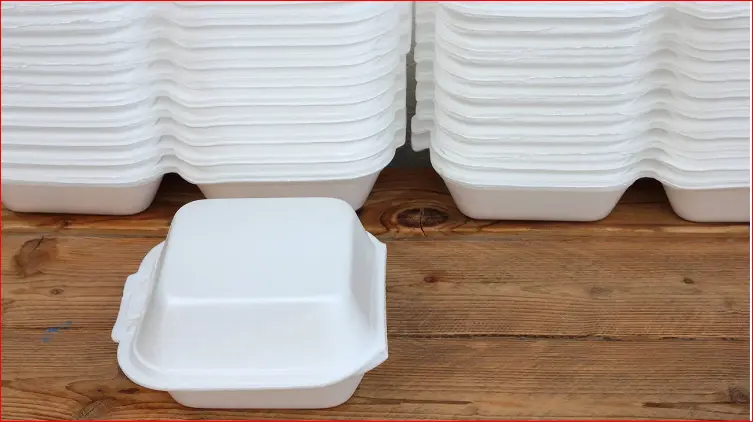The Lagos state government placed a ban on the use of Styrofoam in the packaging of food in January 2024. Styrofoam has been in existence for a long time and is commonly used in the packaging of food by vendors as a cheaper alternative to plastic plates. It has gained popularity in the packaging industry. It is commonly known as “take-away” plates.
What is Styrofoam?
Styrofoam is made from expanded polystyrene known for its exceptional insulation properties. It is commonly used for shipping perishable goods, as it can maintain their temperature and prevent spoilage. It was first discovered in 1836 in Berlin, Styrofoam’s precursor expanded polystyrene (EPS) foam- became immensely popular during World War 2 as an inexpensive building material for military aircraft. Then between 1939 and 1945, the rate of polystyrene production increased and spread crossed the globe.
Styrofoam is a brand of expanded polystyrene foam commonly used for insulation and packaging. The foam is produced by heating and expanding tiny beads of polystyrene with steam. The resulting foam is lightweight, strong, and has excellent insulting properties. Foam polystyrene is made into insulation, packaging, and food containers such as beverage cups, egg cartons, disposable cup holders, and cases for packaging compact discs. Styrofoam is seen as a profitable business because both the distributors and the food vendors benefit from this. Aside from being a cheaper alternative, it is more convenient and light to carry around by customers who do not eat at the eateries.
Ban of Styrofoam in Lagos State
According to information from Lagos, distributors and sellers of polystyrene foam packaging were given three weeks to stop the product in circulation before the state began enforcement. In the weeks since the announcement, people from the ministry have been visiting markets to educate vendors about the ban and the planned enforcement.
Actions focus on polystyrene foam, but further rules on other types of single-use plastic products are expected later in 2024. According to reporting from Cable Ng, the US Nigeria Trade Council has expressed concerns over the sudden implementation of the ban.
A few days after the announcement from Lagos, Abia state followed. Business Post summarized a statement from Abia’s commissioner for an environment that ‘the state government had already banned the use of takeaway packs in the state, but the implementation was relaxed’. However, he emphasized that this time, ‘The state government was serious about the prohibition and would deal decisively with defaulters of the ban.
Local food vendors operating in different parts of Lagos State are in disarray as the ban on ‘take-away’ plates and single-use plastic has left them with few alternatives. Some are voicing their frustration, saying that customers should bring their plastic plates if they do not want to eat them in the shops. Other customers make use of nylon bags in packaging foods as there are cheaper and better alternatives to replace.
However nylon bags are not a safe alternative, it is also less convenient considering their fragile nature, as food placed in them could spill when being transported. Hot food placed in nylon bags also produces chemicals that are harmful to the body. With the drastic reduction in the production materials even the nylon bags are currently being made of inferior materials which can lead to food leaking out.

Nutrition experts urge that the government should try and introduce paper packaging containers as an alternative to Styrofoam and single-use plastic. The use of nylons or cellophane bags to package cooked foods was dangerous. According to the experts, these bags produced dioxins when heated, warning that dioxins are highly toxic and can cause reproductive and developmental damage to the immune system, interfere with hormones, and also cause cancer.
When it comes to the environment, Styrofoam does not help as it clogs places when being broken down into smaller pieces. Because it is non-biodegradable it is hazardous to wildlife, some animals mistake it for food and even consume it.
It is slow to degrade and takes a lot of time for the particles to dissolve quickly. When it is not disposed of properly or tossed in water can produce chemicals that would harm the environment. The government’s ban although to the opinion of many may seem rash. Looking at the danger and harm it has caused over the years, it is better the change starts now. However, the people who make use of this for their day-to-day activities are not pleased not because of the ban but because there is no alternative.
Styrofoam was used because of its cheap and light nature so a replacement had to be akin to that. But one that is safer for the environment and the health of consumers.
Distributors who also stock their shops in dozens so they can retail are at a loss due to the ban. A few of them have come out to say that the three weeks’ notice is short. They argue that ample time may be needed to stop such activities and where to waste the plastic is not made available.
Although the ban placed on styrofoam is good for the environment and is long overdue, the implication on business and individual use is not very welcoming due to the discomfort it brings to the local/street food industry. The government also in placing a ban on styrofoam should provide a suitable substitute in order to breach the gap given by the ban. Proposed materials should be properly tested by these vendors to ensure they will serve the same purpose as styrofoam plates. The substitute should also be safe for disposal or be less harmful to society.
Another aspect the government should look into is that of recycling to save the environment, due to the nature of styrofoam it cannot be easily recycled, however, there are a few ways it can be converted into something new rather than harming the environment, blocking drainages and drainage, gutters. and landfill. Styrofoam can be cleaned and melted to form pellets. These pellets can be used to make more styrofoam plates or items to reduce the number already in the market rather than making more. They can also be reused to make decorations for put into the inventions of more permanent items for interiors.
Styrofoam’s ban may not be pleasant to the market but it can be agreed that it has a negative impact on the environment.









